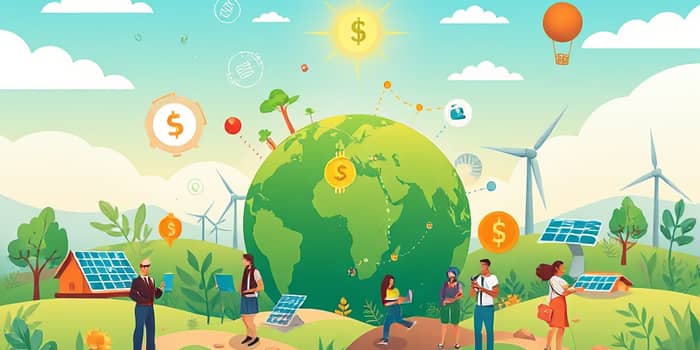
Financial technology is evolving from profit-driven tools into catalysts for global change. By harnessing cutting-edge innovation, we can build a future where finance is a force for ecological restoration and social equity. This movement, known as Fintech for Good, unites visionaries who believe that technology and humanity must advance together.
At its core, Fintech for Good champions a transformation of financial services toward sustainable outcomes. It envisions a world where every transaction contributes to cleaner air, empowered communities, and transparent governance.
Driven by a commitment to planet-centric and socially responsible finance, this movement seeks to address urgent challenges like climate change, poverty, and inequality. By embedding environmental, social, and governance criteria into digital platforms, fintech innovators aim to redirect capital toward long-term wellbeing.
Several breakthroughs underpin the Fintech for Good movement. Artificial intelligence, blockchain, and embedded finance are reshaping how capital flows, decisions are made, and trust is established.
AI-powered underwriting can reduce loan processing times by up to 40 percent, while fraud detection systems protect vulnerable users. Blockchain enables fractional ownership of green assets, democratizing access to solar farms and wind projects.
Embedded finance and banking-as-a-service platforms seamlessly integrate ethical financial products into everyday apps, making sustainability as simple as a tap on the screen. Biometric identity solutions ensure secure onboarding without traditional documentation barriers.
Fintech for Good unlocks new pathways to reduce the trade-off between profit and purpose. Tech-driven models channel capital into clean energy, regenerative agriculture, and community development projects.
By offering tailored solutions for local challenges, fintechs adapt to diverse contexts, from urban sustainability apps to rural microcredit networks. This agility ensures that innovations serve both developed and emerging markets effectively.
Furthermore, enhanced transparency and real-time tracking build trust between stakeholders, encouraging greater participation in sustainable finance and long-term investment in planetary health.
Despite its promise, Fintech for Good must navigate potential pitfalls. Data privacy, algorithmic bias, and greenwashing threaten credibility. Rigorous standards, transparent reporting, and robust regulation are essential to ensure this movement delivers on its lofty ambitions.
Collaboration with regulators, traditional banks, and impact investors is vital. Only through shared governance and ethical frameworks can fintech innovators scale solutions without sacrificing accountability or inclusivity.
The next wave of advances points toward AI-first fintechs for global scale and hyper-personalized financial instruments that reflect individual values. Users will choose investment portfolios based on carbon reduction targets or social justice metrics.
Growing digital literacy and falling technology costs will accelerate adoption, particularly in underbanked regions. As ecosystems mature, we can expect a thriving network of interoperable platforms dedicated to planetary resilience.
Fintech for Good offers a transformative vision where every dollar moved drives ecological regeneration and social uplift. By embracing sustainable, inclusive digital ecosystems for all, we can unlock the full power of finance to heal our planet and empower every individual.
Now is the time to champion innovations that align profit with purpose. Together, we can ensure that financial technology becomes a force for lasting good, safeguarding future generations and the Earth they will inherit.
References





